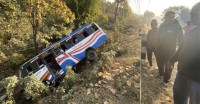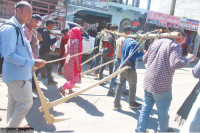National
Multi-billion-dollar Nijgadh Airport project hangs in the balance
The next Investment Board meeting chaired by the prime minister will decide how the project should move ahead, amid reports that the contracted Swiss company is ‘unofficially out’.
Sangam Prasain
The future of the $3.45 billion Nijgadh International Airport project in Bara hangs in the balance.
Amid reports that Zurich Airport International, which was named concessionaire in September last year to develop the project, has withdrawn, the Investment Board of Nepal, the government’s investment agency for large projects, said “no official” communication has come from the Swiss company.
It had outbid competitors, including GMR Group, an Indian infrastructure giant, and had been given a September 30 deadline to submit its investment plan or request for proposal, a formal application by a company, to construct the project.
“But before the deadline, on September 29, the company emailed us stating that they [Zurich Airport International] were not able to submit the RFP [request for proposal] within the drop-dead date of September 30 due to Covid-19 related difficulties,” Dharmendra Kumar Mishra, the board’s spokesperson, told the Post.
“This doesn’t mean that the company has decided to quit. The company said that due to the ‘disaster’ in the civil aviation sector caused by the Covid-19 pandemic, it was unable to submit the RFP within the given deadline,” he said. “There is no further development.”
But a source at the Civil Aviation Authority of Nepal told the Post that the Swiss company is “unofficially out” of the project and that the Tourism and Civil Aviation Ministry is internally preparing to develop the project on its own.
The ministry had recently directed the Civil Aviation Authority of Nepal to select a consultant to prepare an 'updated' master plan for the proposed Nijgadh International Airport, indicating that it doubts if potential builder Zurich Airport International AG will come up with a business plan as promised, officials privy to the matter said.
“Nepal has asked foreign investors to build such a large project but no one has done the homework to facilitate the investors. Investment is our need and we should welcome investors and facilitate them at every step,” an official at the Civil Aviation Authority of Nepal said. “But there is a traditional mindset that the foreigners will take away all the money.”
On Sunday, Tourism and Civil Aviation Minister Yogesh Bhattarai told Parliament’s International Relations Committee that they have kept the option wide open to develop the airport with the government’s own fund.
Since the investment board has not shortlisted other bidders, no other candidate can be chosen if Zurich pulls out.
On September 9, a high-level inter-agency project coordination and facilitation committee, headed by Minister Bhattarai, had asked the Investment Board of Nepal to confirm the final investment decision on Nijgadh International Airport with potential builder Zurich Airport International AG.
The proposed airport in Bara, slated to become the largest airport in terms of area in South Asia, has been embroiled in controversy over its environmental impact.
On December 6 last year, the Supreme Court Justice Tanka Bahadur Moktan issued a stay order asking the government to immediately stop felling of trees at the site, which a division bench of Chief Justice Cholendra Shamsher Rana and Justice Kumar Regmi upheld on December 22.
According to an environmental and social impact assessment carried out by the Tourism and Civil Aviation Ministry in February 2017, more than 2.4 million small and large trees need to be felled to build the airport. In the first phase alone, in which one of the two runways and the terminal would be built, 769,691 trees spread over 2,500 hectares would have to be cleared. The plan has drawn criticism from various quarters.
Environmentalists say that axing so many trees would drastically affect the biodiversity of the area. The results could be catastrophic for many animals that call the Nijgadh forests home, they say.
The Civil Aviation Authority of Nepal, the project executing agency, had recently said they had reviewed the plan to reduce the environmental impact and the project would be spread over only 1,900 hectares in the first phase.
But the Investment Board of Nepal decided to move ahead nonetheless and invited potential bidders on the grounds that the court order only mandated that trees not be cut down, but did not say that all work should come to a halt.
On January 17, the board formally asked Zurich Airport to submit a business proposal as the sole company to work in a public-private partnership model for the international airport in Nijgadh.
Under the public-private partnership modality of ‘build operate and transfer’, the Swiss company would fully fund the construction project.
The cost of the first phase of the development alone has been estimated at $1.2 billion.
The Swiss firm was supposed to propose in the request for proposal documents, the deadline for which was September 30, how long it would operate the airport before handing it over to Nepal.
After the Supreme Court order last December, Zurich International Airport AG had asked for an extension to the earlier March 1 deadline to submit a business proposal.
The planned air hub at Nijgadh, about 175 km southeast of Kathmandu, is expected to serve as an alternative to congestion and winter fog at Tribhuvan International Airport, the country’s sole aerial gateway.
The government had decided to develop Nijgadh International Airport, one of its most ambitious projects ever, in 1995. The timeline for the airport has been pushed back on multiple occasions amid concerns about financing and legal issues over its environmental impact.
Upon completion of the first phase of the project, the airport will be able to handle 15 million passengers annually and accommodate the Airbus A380 superjumbo. A 76-km Kathmandu-Tarai expressway will link the capital with Nijgadh.
“Such a mega project is difficult to construct as there are several controversies,” lawmaker Deepak Prakash Bhatta, a member of Parliamentary International Relations Committee, told the Post. “We have time and again suggested that the government set up a special purpose vehicle to develop such a project that lands in controversy at every step.”
The special purpose vehicle is a separate company that is normally created in order to undertake a risky project.
But in the absence of such a company, the Investment Board of Nepal makes decisions on it.
The board’s next meeting that will convene under Prime Minister KP Sharma Oli, who chairs the board, will decide how things should move ahead, according to Mishra, the spokesperson.
The meeting date, however, has not been finalised.
“If it’s the issue of the time extension, the board will decide,” Mishra said.




 19.57°C Kathmandu
19.57°C Kathmandu














